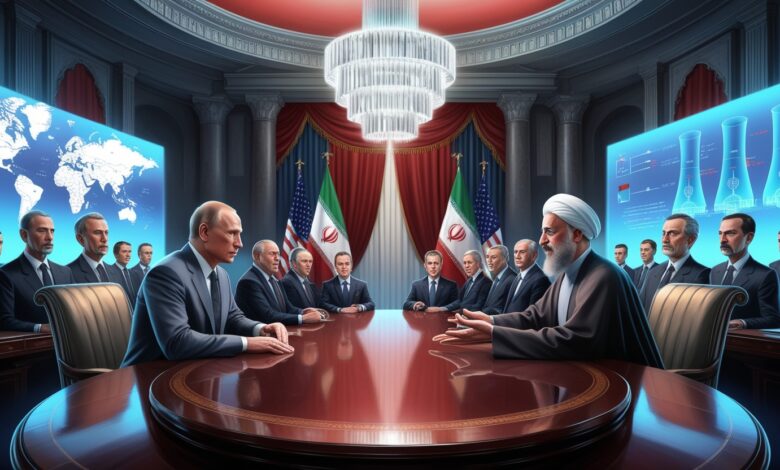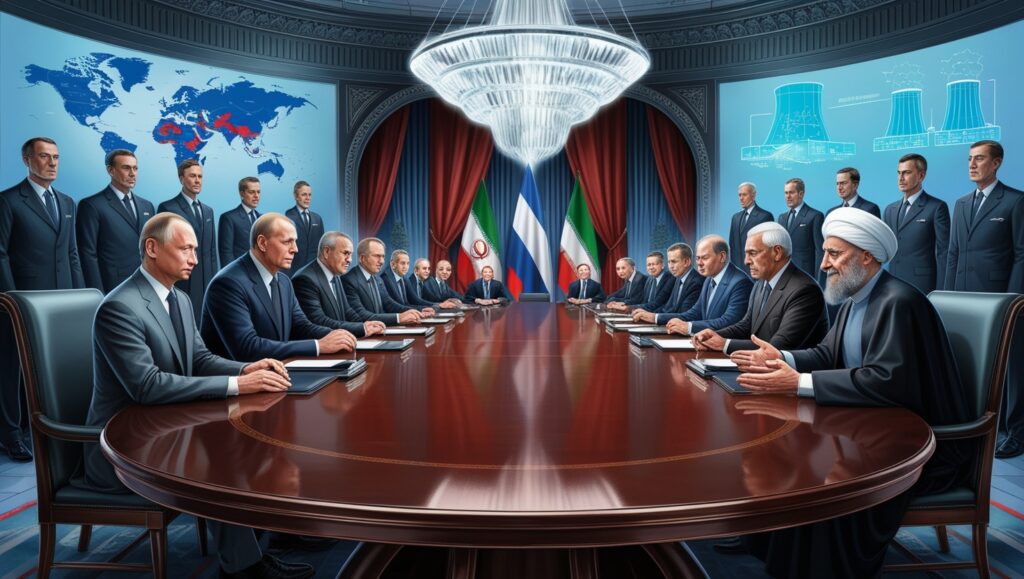Secret Nuclear Deal Between Russia and Iran: Implications for Global Geopolitics

In a dramatic turn of events, intelligence reports from the United States and the United Kingdom suggest a secretive nuclear weapons deal between Russia and Iran. This potential arms link-up, which includes ballistic missiles from Iran in exchange for nuclear weapons from Russia, has raised alarms across Western nations, as well as Israel, causing widespread concern about the impact on regional and global security.
Russia and Iran’s Alleged Nuclear Arms Deal: What’s at Stake?
The Western media has been rife with reports that Russia has quietly provided Iran with nuclear weapons technology. Although official confirmation is lacking, the speculation alone has triggered heightened fears among geopolitical experts. Russia, long considered a powerhouse in defense manufacturing, now faces a new front in its relationship with the West, as suspicions of a clandestine nuclear arms exchange grow stronger.
The U.S. and U.K. Respond: Alarm Bells Are Ringing
In both the U.S. and the U.K., political leaders, including President Joe Biden and Prime Minister Keir Starmer, are reportedly on high alert. Intelligence agencies have warned that this covert deal could have already transported several nuclear weapons to Iran. This revelation poses an existential threat, particularly if Iran conducts an underground nuclear test and announces its entry into the elite club of nuclear-armed nations.
- Key Quote from Intelligence Reports:
“We are deeply concerned about the growing collaboration between Iran and Russia in the nuclear sphere. If confirmed, this could mark a dangerous shift in the balance of power in the Middle East.”
— U.S. Defense Department Spokesperson
Iran’s Role in the Nuclear Equation: A New Player on the Global Stage?
Iran’s involvement in this arms deal highlights its growing ambitions in the geopolitical landscape. Traditionally seen as a regional power, Iran’s alleged acquisition of nuclear weapons, whether through direct assistance from Russia or self-developed technology, could drastically alter the security dynamics of the Middle East.

Scenarios: What Happens If Iran Becomes a Nuclear-Armed State?
If the reports are accurate, Iran could soon join the list of nations with nuclear weapons. Experts believe that Iran is either preparing to conduct a nuclear test or, worse, considering an open declaration of its new status as a nuclear power.
- List of Current Nuclear-Armed Nations:
- Russia
- United States
- China
- France
- United Kingdom
- Pakistan
- India
- Israel
- North Korea
Iran’s potential addition to this list would not only escalate tensions with Israel but could also prompt neighboring countries to reconsider their defense strategies. Israel, in particular, is expected to respond with forceful measures to ensure its security.
Biden Warns Trump’s Rhetoric, Promises Support for Black Americans
The Geopolitical Fallout: Russia’s Endgame
Russia’s involvement in this deal is not without reason. Facing increasing pressure from the West, especially in light of the ongoing Ukraine conflict, Russia appears to be seeking alternative alliances to counterbalance NATO and Western sanctions. In return for providing nuclear technology to Iran, Russia is reportedly receiving ballistic missiles that it can use to further its military operations in Ukraine.
- Why Does Russia Need Iran’s Ballistic Missiles?
Despite being a dominant force in defense manufacturing, Russia has been facing challenges in its war with Ukraine. As Ukraine’s air defense systems, including the U.S.-provided Patriot missiles, become increasingly effective, Russia needs new tactics to break through. Iran’s ballistic missiles offer a low-cost solution, allowing Russia to deploy varied attacks, which may confuse Ukrainian defenses and increase the chances of successful strikes.
Israel’s Growing Concerns: A Looming Threat?
Israel has been closely monitoring the growing ties between Russia and Iran. The export of ballistic missiles from Iran to Russia is troubling enough, but the potential for Iran to acquire nuclear weapons is an even greater concern. If Iran conducts a nuclear test, Israel’s security could be significantly compromised, leading to a potential military conflict.
Could Israel Strike Preemptively?
As tensions rise, experts warn that Israel could take preemptive military action to neutralize Iran’s nuclear capabilities. Both Israel’s ruling party and opposition have voiced strong concerns, and any such test could serve as a trigger for an Israeli response.
- Key Quote from Israeli Defense Officials:
“We will not allow Iran to possess nuclear weapons, and we are prepared to take all necessary measures to prevent this.”
— Israeli Defense Ministry
The Global Repercussions: A Call for Diplomacy
The unfolding situation demands a swift diplomatic response from the international community. World leaders, including those from the United States and India, are expected to engage in peace talks to prevent any further escalation. A nuclear arms race in the Middle East would have devastating consequences, potentially drawing multiple nations into direct conflict.
Russia’s Justification: A Strategic Move?
Vladimir Putin may argue that his decision to support Iran is merely a response to the West’s ongoing military support for Ukraine. For months, Russia has accused the West of supplying Ukraine with not just conventional weapons but also chemical agents. Whether these claims hold any truth remains unclear, but it provides Russia with the rationale to justify its actions.
Conclusion: What’s Next for Global Security?
The coming months will be critical in determining the future of global security. If Iran does indeed acquire nuclear weapons, it will likely trigger a cascade of responses from Israel, the U.S., and other world powers. The balance of power in the Middle East could shift dramatically, with long-lasting consequences for international relations.
As the world waits, all eyes are on Iran. Will they confirm or deny the rumors? And how will the international community respond if these allegations prove true? One thing is certain: the stakes could not be higher.






One Comment